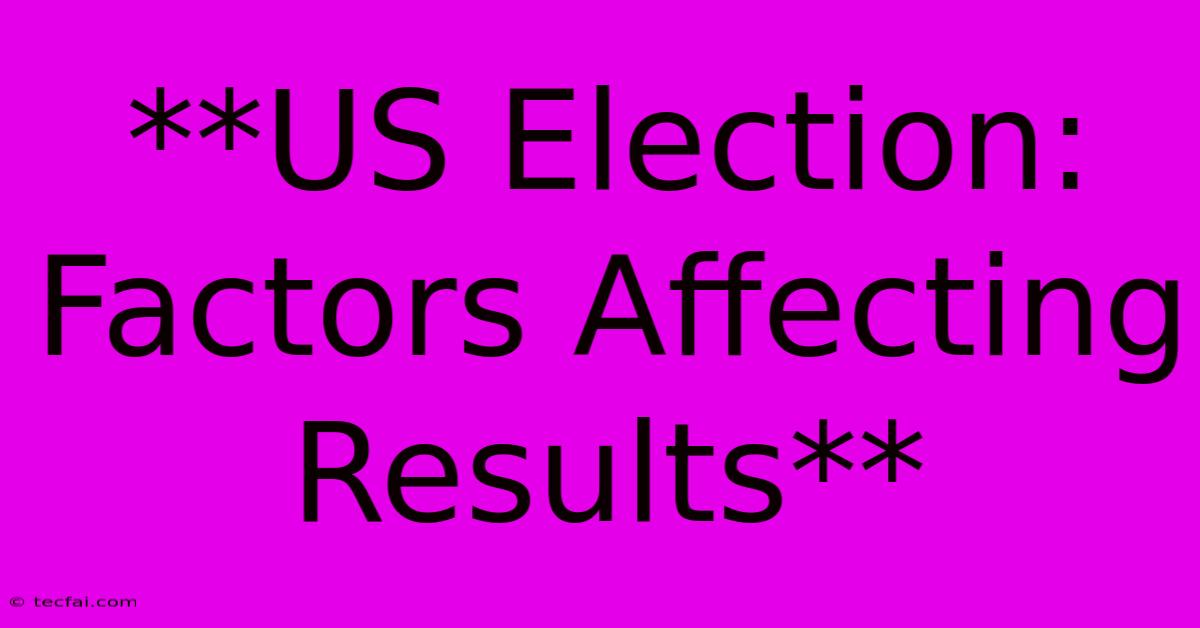**US Election: Factors Affecting Results**

Discover more detailed and exciting information on our website. Click the link below to start your adventure: Visit Best Website tecfai.com. Don't miss out!
Table of Contents
US Election: Factors Affecting Results
The US presidential election is a complex and multifaceted event, with numerous factors influencing the outcome. From the candidates themselves to the broader political climate, understanding these influences is crucial to analyzing the results and predicting future trends. This article will delve into some of the key factors that can significantly impact US elections.
1. The Economy
The state of the economy is arguably the most significant factor influencing voter behavior. Economic growth, unemployment rates, inflation, and consumer confidence all play a role in shaping public perception of the incumbent administration. Voters often hold the president accountable for economic performance, and a struggling economy can lead to dissatisfaction and a shift in political sentiment. For example, in 2008, the Great Recession significantly impacted the election, contributing to Barack Obama's victory over John McCain.
2. Social Issues
Social issues are becoming increasingly important in US elections, particularly for younger voters. Abortion, gun control, LGBTQ+ rights, and climate change are all topics that can galvanize voters and mobilize them to support specific candidates. The prominence of these issues often depends on the candidates' stances and the political climate at the time.
3. Candidate Characteristics
The personal qualities of the candidates, including their experience, charisma, and political ideology, can have a significant impact on the outcome of an election. Voters often make decisions based on factors such as a candidate's trustworthiness, leadership abilities, and ability to connect with voters on a personal level. In recent elections, factors like age, gender, and race have also played a role in shaping voter perceptions.
4. Political Polarization
In recent years, the US political landscape has become increasingly polarized. This divide between the two major parties has made it difficult to find common ground and has led to a more hostile political environment. Political polarization can influence voter turnout, campaign strategies, and ultimately, the results of the election.
5. Media Coverage
The media plays a crucial role in shaping public perception of candidates and issues. News coverage, political commentary, and social media platforms can influence voter opinions and ultimately impact the election outcome. The way candidates are portrayed and the issues that are emphasized can significantly affect how voters view the candidates and their policies.
6. Voter Turnout
The number of people who vote in an election can have a significant impact on the outcome. Historically, lower voter turnout has favored Republican candidates, while higher turnout has benefited Democrats. This can be attributed to the demographics of those who tend to vote in higher or lower numbers.
7. Electoral College
The Electoral College system, which determines the winner of the presidential election, is another factor influencing the results. While popular vote counts are important, the focus on individual states and their electoral votes can lead to scenarios where a candidate wins the presidency despite losing the popular vote. This system adds another layer of complexity to US elections and can lead to surprising outcomes.
Conclusion
US elections are complex events influenced by a variety of factors, from the economy and social issues to candidate characteristics and the media. Understanding these influences is essential to analyzing the results and predicting future trends. As the political landscape continues to evolve, it is crucial to stay informed about the factors shaping the political environment and how they impact the decisions voters make.

Thank you for visiting our website wich cover about **US Election: Factors Affecting Results** . We hope the information provided has been useful to you. Feel free to contact us if you have any questions or need further assistance. See you next time and dont miss to bookmark.
Featured Posts
-
Kat Mc Guffie Steps Down From Abc Role
Nov 06, 2024
-
Stein On Election Democrats To Blame
Nov 06, 2024
-
Real Madrid Stumbles Milan Takes Advantage
Nov 06, 2024
-
Harris Vs Trump Americans Choose
Nov 06, 2024
-
Us Election Results What To Watch
Nov 06, 2024
